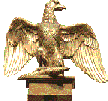
1750-1815 Battles: French vs British.
Era of Modern Bayonet

.
.
.
You probably wonder why did we add this introduction to the list of French-English battles in th era of modern-bayonet. The answer is quite simple, after the publication of the list we begun receiving e-mails from people who claimed that we chose this period only for one reason. This is to show the so-called "low point" of their favorite (French or British) army. These people were (and some still are) genuinely convinced that their army, French or British, was invincible. There’s been well-worn chest-thumping rants, military brouhaha, about the victories and invincibility of the French and British armies by our French and English visitors.
For this reason we have decided to give examples of French and British military failures and defeats suffered during other periods. Basically, this short introduction is only for the worshippers of the French and British army. If you are not one of them, go directly to the list of battles and combats.
According to Julius Caesar, the nations and armies are like individuals, go through times of being more courageous or less so, according to circumstances. Every country, no matter how big and strong, had better and worse periods, periods of success and periods of failures and defeats etc.
The Roman army - considered by many military experts as the best military machine - experienced just that.
I would say they fell into so-called "victory disease" (according to wikipedia.org: "a habit whereby military commanders, armies, and even whole nations, having experienced a series of previous military victories, becomes susceptible to defeat. This change is often characterized by the emergence of arrogance, stereotypes of enemy, disregarding their actual military capacity etc.")
English military.
ps.
French military.
And as with the English, the French army have enjoyed far more victories than defeats.
The French troops also marched into Madrid, Lisbon, Berlin, Amsterdam, Warsaw, Vienna, Rome, Vilno, and Moscow. You can easily find books, articles and websites devoted to the French victories at Austerlitz, Borodino, Friedland, Jena etc. For those interested in the Napoleonic French army I recommend John Elting - "Swords Around a Throne" (excellent read)
 1. Introduction - "The Invincibles"
1. Introduction - "The Invincibles"
2. French vs British: Battles, Combats, Actions, Skirmishes.
3. Addititional information from our visitors.
4. "I HATE France !"
5. Links.
often embellishing tales of their own bravery
and exaggerating enemy’s losses.

Introduction
"The Invincibles" and chest-thumping
France and England were two of five the most successful militarily nations.
But do not believe those who claim that their troops were invincible and never defeated. The history of the two countries are full of "ups and downs" on military field. The so called superiority of this or other nation lies in their authors self-aggrandizing patriotic jingoism. Many participants of the campaigns denied their own mistakes for reasons of personal and national pride. Wellington refused to write the history of the battle of Waterloo because if he had, he would have had nothing good to say about some of the participants who were celebrated as heroes. Wellington wrote to the Earl of Mulgrave: "If a true history is written, what will become of the reputation of half of those who have acquired reputation, and who deserve it for their gallantry, but who, if their mistakes and casual misconduct were made public, would not be so well thought of ?" Below just few examples of "ups and downs" of England and France on military field.
 The English boasts of himself that he is so tough soldier that he does not know when he is
beaten. Samuel Johnson wrote: "Our nation may boast, beyond any other people in the world,
of a kind of epidemic bravery." :-)
The English boasts of himself that he is so tough soldier that he does not know when he is
beaten. Samuel Johnson wrote: "Our nation may boast, beyond any other people in the world,
of a kind of epidemic bravery." :-)
Reading certain accounts of English mega-prowess at war, you wonder if the English casualties
are not all caused by friendly fire. The authors have a knack of turning defeat into victory
in the Dunkirk style. (Mind you, the catastrophe at Dunkirk was called by many as
"It is victory!" and was celebrated in speeches, paintings and poems.)
You may even think they were never defeated. Actually the British troops were defeated not only by
other Europeans (between 1750 and 1815 they lost more than 60 battles to the French alone)
but also by about everyone they ever fought with; Albanians (78th Foot at Rosetta),
Argentinians (in 1806-7 at Buenos Aires), Americans (at Cowpens and in 1815 at New Orleans),
Poles (in 1810 at Fuengirola), native Indians (at Monongahela), Egyptians (1807 at El-Hamad
or Hamaad) etc.
At Cowpens the Americans demolished some of the best British infantry. Babits writes: "When
the British infantry reached a point '40 or 50 yards' or an even closer - '30 to 40 paces' -
the militia commenced volley fire ... The fire was returned but not with vivacity or
impression. ... They were by this time within 30 yards of us ... " The American commander said
to his officers: "They (British) are coming like a mob. Give them a fire and I will charge
them." The Americans delivered a volley and the damage was great. Some British soldiers
'threw down their arms and fell upon their faces.' The 'unexpected fire ... stopped the
redcoats and threw them into confusion. Exertions to make them advance were useless [and]
an unaccountable panic extended itself along the whole line." Howard ordered a charge with
the bayonet, which order was obeyed with great alarcity.'
T. Young saw the 'British broke, and throwing down their guns and cartridge boxes, made for
the wagon road, and did the prettiest sort of running !"
[Babits - "A devil of whipping - the battle of Cowpens"]
In October 1813 the British infantry was routed by the Americans in Battle of the Thames.
Despite flanking fire, Johnson's Americans broke through. Immediately Procter's redcoats
turned and fled the field, many of them surrendering. Tecumseh's Indians remained and kept up
the fighting. The British had 489 killed, wounded, and prisoners. The Americans suffered
only 3 casualties. The rest of the American casualties were inflicted by the Indians,
who fought with determination. Procter was later court-martialed for cowardice and removed
from command.
After the American War of Independence the British infantry became an effective force
until the parade of failed invasions on the Continent. French General Suchet defeated two
British amphibious expeditions from Sicily against Spain's east coast. General Souham
succeeded in taking the fortress of Nijmegen defended by 30.000 English infantry supported
by 1.200 Dutch troops.
In 1808 British corps landed in Spain but when was threatened by Napoleon, they fled.
General Moore was pushing his troops so hard that discipline almost collapsed, men deserted,
and some cannons were abandoned. Moore's 200 mile run to Coruna was a very desperate one.
The French knocked the stuffing out of him with the Brits being not just taken to the cleaners
down to the coast by Napoleon's troops, but washed, pressed and sent home in a brown paper
bag.
Moore's failure was followed by the "disaster of Walcheren". In 1814 at Berg-op-Zoom
the British 55th and 69th Regiment of Foot advanced in the dark then suddenly broke and
fled in a wild panick. Not a shot was fired at them, nor was a single Frenchman seen."
(Nafziger - "Imperial Bayonets" 1996 p 164)
Defeats and/or failures suffered during other periods:
About 200 BC 'England' had been invaded by Belgic peoples. 'England' was subjugated by Romans
for very long time (400 years). The Roman Governor of Britain, Suetonius Paulinus, met the
tribesmen in a bloody battle of Boudica. Some 80,000 of the tribesmen were slaughtered,
against only 400 Roman dead. After Romans 'England' was repeatedly invaded and conquered by
the Vikings.
There were days when the Danes made the British tremble, and the English litany included the
prayer, "From the fury of the Danes, Good Lord deliver Us."
After Romans and Vikings came
Normans from France
(ext.link) The Norman French warriors defeated the English infantry at the Battle of Hastings
(1066) and the Norman leader, William Conqueror and his descendants replaced the Anglo-Saxons
as the ruling class of England.
(Scotland was never conquered by "foreigners", it became part of United Kingdom and the Act
of Union was signed by "bribed Scottish aristocrats" (according to nationalist Scottish
history).
During WW2 the japanese soldiers said they couldn't regard the British soldiers as
soldiers since they "didn't fight". The Battle of Singapore was a brilliant military success
by the Japanese against superior numbers and equipment of British infantry (140.000 Brits vs
40.000 Japanese)
"On May 10th 1940, the British Guards land at Hook of Holland, to clear the road to the Hague
of German airborne and paratroops. By the time they are ready to attack, the Dutch have
cleared the road themselves.
The Guards are then requested to help clear other areas in the vicinity of Hook, but they
refuse, it not being their exact orders. A refinement of the request to have the Guards defend
the fortress of Hook, so the garisson could help clear the area is also refused, the Guards
just stay in the docks. When on the 12th a rumour arrives that German tanks have crossed the
bridges at Rotterdam (which did not happen until after the armistice on the 14th), they flee
in total disarray by sea, leaving all their equipment behind !
(Lt. Col. Brongers "De slag om de Afsluitdijk" and "De slag om de Residentie")
According to wikipedia.org in July 1944 during the Operation Goodwood the British and
Canadian tanks and bombers destroyed 109 German tanks, for the loss of ... 413 tanks!
In June 1944 at Villers Bocage German tank company single-handedly took on a column of
the British 7th Armoured Division, and literally destroyed it, so forestalling General
Montgomery's planned unhinging of the Wehrmacht's Caen defense. Only in this combat there
were 138 destroyed British tanks and 250 destroyed armoured personal carriers, anti-tank guns
and transporters. German commander's tank alone destroyed with easy 14 British tanks. Pretty
good for a day's work, don't you think ?
Days after this fight just the sighting of a
Tiger tank caused panic amongst British troops. During further battles German radio men
sometimes picked up such messages like "Help, Help, Tiger Tank !" Montgomery banned any
combat report describing the fights between German and British tanks. According
to Montgomery these reports undermined the morale of his troops.

Surrender of the British at Yorktown 1781. Picture by Rocco.
[The French commander is in white uniform, the American in dark blue. Both are mounted.
According to legend, the British marched to the fife tune of "The World Turned Upside Down,"
though no real evidence of this exists. British Prime Minister Lord North resigned.]
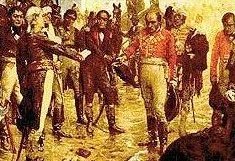
British commander Carr Beresford surrenders
to the Argentinians, 1806-7
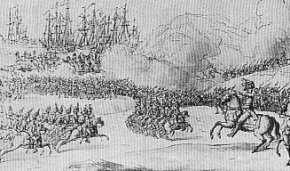
The British troops fled before the French at Corunna.
Picture by Naudet.

The British troops fled before the Germans at Dunkirk, 1940.
Photo, author unknown.
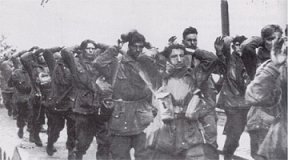
The British troops surrender to the Germans, 1944.
Photo, author unknown.

The British troops surrendering to the Japanese at Singapore, 1942.
[Many 'directives' to the British troops from commanders and the Prime Minister himself
made bold proclamations about 'not giving any ground' in Singapore.]
To our French visitors: please don't send us more pictures.
 According to wikipedia.org the French military history is perceived in the USA as being
mired by humiliating defeats (such as in the Franco-Prussian War). Relations between France
and the United States plunged following Paris's fierce opposition to the U.S.-led war in Iraq.
The French military is often the butt of jokes from American comedians such as Jay Leno.
"For some reason, France and chicken match together" (a commercial campaign by Subway in
2004 about a new chicken sandwich). Some restaurants pulled French wine off their menus.
According to wikipedia.org the French military history is perceived in the USA as being
mired by humiliating defeats (such as in the Franco-Prussian War). Relations between France
and the United States plunged following Paris's fierce opposition to the U.S.-led war in Iraq.
The French military is often the butt of jokes from American comedians such as Jay Leno.
"For some reason, France and chicken match together" (a commercial campaign by Subway in
2004 about a new chicken sandwich). Some restaurants pulled French wine off their menus.
England and France have a long history of conflict. There has also been an element of
class conflict in these attitudes, as after Hastings and the colonization by William the
Conqueror, the aristocracy that ruled England was French-speaking and of French origin,
while the majority of England's population was Anglo-Saxon. The modern history of conflict
between France and England stems from the rise of English effect into a position as a
dominant mercantile and seafaring power. Hostility toward and strategic conflict with France's
similar ambitions became a defining characteristic of relations between the two powers.
According to wikipedia.org the dimensions of this conflict in Britain were as much
cultural as strategic. In the aftermath of the French defeat in the World War II, assessments about French military
abilities suffered a significant reverse in the USA and England.
Some authors want you to believe that Wellington's redcoats had exclusivity
in defeating Napoleonic marshals. This is not correct, the Prussians and Russians won more battles against the French
than the British. Below is a list of French defeats during the Napoleonic wars (and it
was France's most glorious period):
Queetz - Russians defeated French (under Marshal Ney)
Sacile - Austrians defeated French (under Eugene)
Aspern-Essling - Austrians defeated French
Kliastitzy - Russians defeated French (Oudinot)
Svolna - Russians defeated French (Oudinot)
Vinkovo - Russians defeated French (Murat)
2nd Polotzk - Russians defeated French (Oudinot, Victor)
Viasma - Russians defeated French
2nd Krasnoi - Russians defeated French (Roguet and NAPOLEON)
Plechenitzi - Russians defeated French (Oudinot)
Möckern - Russians and Prussians defeated the French (Eugène)
Luckau - Russians and Prussians defeated French (Oudinot)
Gross-Beeren - Russians and Prussians defeated French (Oudinot)
First Pirna - Russians defeated French (St. Cyr)
Second Katzbach - Prussians defeated French (Macdonald)
Second Pirna - Russians defeated French (Vandamme)
Kulm - Russians, Prussians, Austrians defeated French (Vandamme)
Dennewitz - Prussians defeated French and allies (Ney)
Wartenberg - Prussians defeated French and allies (Bertrand)
Möckern - Allies defeated French (Marmont)
Leipzig - Russians, Prussians, Austrians defeated French (NAPOLEON)
La Rothière - Russians, Austrians, Prussians, Bavarians defeated French (NAPOLEON)
Bar-sur-Aube - Austrians, Russians, Bavarians defeated French (Oudinot)
Lâon - Prussians, Russians defeated French (NAPOLEON)
Fismes - Prussians defeated French (Marmont)
Arcis-Sur-Aube - Allies defeated French (NAPOLEON)
La Fère Champenoise - Russians defeated French (Marmont and Mortier)
Paris - Allies defeated French ( Marmont and Mortier)
The failures and defeats were not something limited only to the Napoleonic wars. World War 2 was a humilation for the French army. Even though millions of French troops were manning the defensive Maginot Line in early 1940, Hitler's brilliant blitzkrieg strategy caught the Allies by surprise.
The Germans skirted the Maginot Line and slashed into France through Luxembourg and the Ardennes Forest. The Blitzkrieg moved with lightning speed as Hitler's tanks turned and raced headlong to the sea. They reached the English Channel on May 21 cutting off the French and British armies in the North. The Germans turned again, fighting their way north to secure the coastal ports and annihilate the trapped armies. Germany occupied France within just 6 weeks.
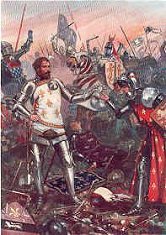
The French surrender after the battle of Poitier, 1356.
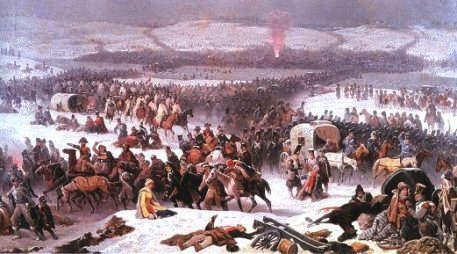
The French army fleeing from Russia, 1812. Battle of Berezina.
[Of the 600,000 men that Napoleon had organized for his invasion of Russia,
barely 100,000 remained. Napoleon wrote: "I have no army any more!
For many days I have been marching in the midst of a mob of disbanded,
disorganized men, who wander all over the countryside in search of food."
It was probably the greatest disaster of the French army ever.]
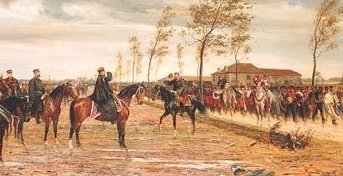
The French surrender to the Prussians at Sedan, 1872.
[By the end of the battle of Sedan, with no hope of breaking out,
Napoleon III called off the attacks. He surrendered himself
and the entire Army of Châlons to Moltke and the Prussian King.]
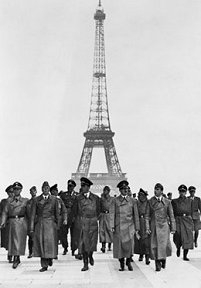
The French surrender to the Germans in 1940.
[The Germans smashed the French and British forces in 1940.
The remaining British troops fled to Dunkirk and France surrendered to the Germans.]
So, were the French and British armies great ? Yes.
Were they invincible ? Definitely not.
|

Battles: French vs British Era of 'modern' bayonet (socket-bayonet) and musket.
The term "bayonet" is thought to have derived from the French town of Bayonne, and referred to a long knife or dagger (ext.link) which was carried by soldiers.
In late 1690s more emphasis began to be placed on the use of the musket as a primary weapon of the common soldier and as a result, the long pike was gradually phased out and so called plug-bayonet was introduced. It was a spear-like blade to which was attached a long conical steel plug inserted directly into the muzzle of the soldier`s musket, a collar lodging against the barrel to prevent it sliding too far in. The disadvantage of this bayonet was that once fixed, the gun cannot be fired until the bayonet was removed.
The triangular socket bayonets were used in the following wars between France and Great Britain:
* - the majority of 'French battles' was won by the French alone (but not all, the French also used foreigners, Indians, etc.), while the vast majority of 'British battles' was won by a mix of German, British and other troops. Often the British troops consisted only few percentages or half of the victorious army and it's very difficult to call their victories as only 'British'. For example at Waterloo the British infantry battalions consisted of 30 % of all battalions. In contrast the Germans made up 50 %, and the Dutch and Belgian 20 %. So it was rather an international or German victory over the French, and not British.
|

"I HATE France !" Excerpts from the website "I hate France." "The new big thing on the web is all these sites with names like "I Hate France," with supposed datelines of French military history, supposedly proving how the French are total cowards. ... Well, I'm going to tell you guys something you probably don't want to hear: these sites are total bullshit, the notion that the French are cowards is total bullshit, and anybody who knows anything about European military history knows damn well that over the past thousand years, the French have the most glorious military history in Europe, maybe the world. ...
I hate [President] Chirac too, and his disco foreign minister with the blow-dry 'do and the
snotty smile. But there are two things I hate more than I hate the French: ignorant fake war
buffs and people who are ungrateful.
Long before that, in fact as soon as we showed the Brits at Saratoga that we could win once in a while, they [the French] started pouring in huge shipments of everything from cannon to uniforms. We'd never have got near Yorktown if it wasn't for massive French aid.
So how come you bastards don't mention Yorktown in your cheap webpages?
The thing that gets to me is why Americans hate the French so much when they only
did us good and never did us any harm. Like, why not hate the Brits?
They're the ones who killed thousands of Americans in the Revolution,
and 30 years later they came back and attacked us again.
That time around they managed to burn Washington DC to the ground while they were at it.
Sure, the easy answer is because the Brits are with us now, and the French aren't.
... Now let's talk about ignorant. And that's what you are if you think the French
can't fight: just plain ignorant. Appreciation of the French martial spirit is just
about the most basic way you can distinguish real war nerds from fake little teachers' pets.
Hell, Stalin signed a sweetheart deal with Hitler out of sheer terror, and Stalin wasn't a
man who scared easy. The French were scared, all right. But they had reason to be.
For starters, they'd barely begun to recover from their last little scrap with the Germans:
a little squabble you might've heard of, called WW I.
WW I was the worst war in history to be a soldier in. WW II was worse if you were a civilian,
but the trenches of WW I were five years of Hell like General Sherman never dreamed of.
I'd really like to see one of you office smartasses joke about "surrender monkeys" with a French soldier, 1914 vintage. You'd piss your dockers. Shit, we strut around like we're so tough and we can't even handle a few uppity Iraqi villages. These guys faced the Germans head on for 5 years, and we call them cowards? And at the end, it was the Germans, not the French, who said "calf rope." When the sequel war came, the French relied on their frontier fortifications and used their tanks (which were better than the Germans', one on one) defensively. The Germans had a newer, better offensive strategy. So they won. And the French surrendered. Which was damn sensible of them. This was the WEHRMACHT. In 2 years, they conquered all of Western Europe and lost only 30,000 troops in the process. That's less than the casualties of Gettysburg. You get the picture? Nobody, no army on earth, could've held off the Germans under the conditions that the French faced them. The French lost because they had a long land border with Germany. The English survived because they had the English Channel between them and the Wehrmacht. When the English Army faced the Wermacht at Dunkirk, well, thanks to spin the tuck-tail-and-flee result got turned into some heroic tale of a brilliant British retreat.
...
Here's a quick sampler of some of my favorite French victories, like an antidote to those
ignorant websites. We'll start way back and move up to the 20th century.
Tours, 732 AD: The Muslims had already taken Spain and were well on their way to taking the
rest of Europe. The only power with a chance of stopping them was the French army under
Charles "the Hammer" Martel, King of the Franks (French), who answered to the really cool
nickname "the Hammer of God." It was the French who saved the continent's ass.
I could keep listing French victories till I had a book. In fact, it's not a bad idea. A nice big hardback, so you could take it to the assholes running all the anti-French-military sites and bash their heads in with it."
|

Links.
Recommended Reading.
Bayonet
Bayonet History
French and British Struggle for Domination
History of France.
French History Timeline. (Graphic Intensive)
Military History of France
History of England
History of Britain
Napoleon, His Army and Enemies